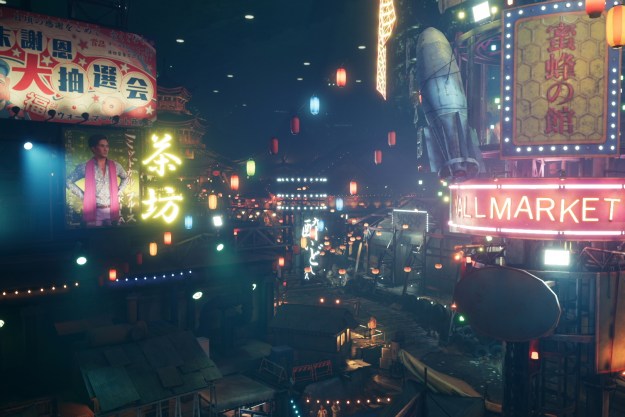
“...although the complete Final Fantasy VII storyline is a fascinating, emotional globetrotting adventure, this first 40-hour romp is anything but.”
- A well-written expansion of one of gaming's most beloved stories
- Visually striking when the story calls for it
- Generously voiced and gorgeously scored with solid performances all around
- Combat attempts to be too much at once
- Level design boils down to corridors, platforms, and staircases
- Extremely linear gameplay with little exploration
- Too much fluff between the good stuff
Final Fantasy VII Remake is here to take things in a new direction more than two decades after the original gave us a hero and villain almost as recognizable as Mario. While it’s bold and sometimes beautiful, this much-anticipated update is the latest casualty of a company putting too much faith in its veteran designers.
Square Enix changed the gaming landscape with the seventh iteration of the Final Fantasy franchise 23 years ago. Final Fantasy VII had a profound impact on the lives of millions of kids and adults. Its warm reception influenced a CGI feature film that expanded its story further, as well as some interesting spinoffs.
I only played this cultural milestone a full decade after its release, at the request of a close friend who was ensnared by Cloud and Sephiroth’s dreamy polygonal good looks.
Hopping off a train as Cloud, a young mercenary with a grudge against Shinra, the world’s corporate overlord, is still a fantastic opening all these years later. Other than the cash on the table, it’ll be a long time before we fully understand why he’s helping a militia detonate a bomb inside what’s essentially a nuclear reactor. Original story scribe Nojima keeps Cloud’s enigmatic personality trickling out at the behest of its gripping cast of characters throughout the 40-hour campaign, but puts us, as players, in charge of the dreary teenage heartthrob for so long that it gets stale far too early.

Introducing the more repetitive gameplay elements so soon doesn’t help matters. You’re at the mercy of some truly egregious sections each time the story decides to take a breather. In between the engrossing cutscenes that put the 2005 movie to shame, it’s a slow-moving, heavily scripted adventure through dark tunnels and corridors, with plenty of glacially paced area transitions and incredibly uninspired switch and platform sections.
Midgar, the industrial city in the sky this whole tale is centered around, is humongous. But beyond a trip for pizza and some light identity theft, you barely get to see it. There’s a reason for that, of course. You spend most of your time in the slums below, but even the shadow of this steel state is little more than long, narrow pathways with impressively written yet graphically underwhelming shantytowns.
Fast, fluid, flawed
Unless you decide to play on its more relaxed difficulty setting, combat in Final Fantasy VII Remake is handled almost exclusively in real time. It’s a stark difference from the original’s turn-based system, and one that doesn’t always yield the best results. Stylistically, it’s absolutely gorgeous. Attacks have some real weight and flair. And while summons feel tossed in with little fanfare, tearing them out of their assigned material and having them wreak havoc is almost enough to detract from some of the harsher realities of this otherwise convoluted battle system.
When you’re given the chance to put your all into a battle, there’s no better feeling. Boss fights, like the Airbuster mech, are as magical as they are stressful. There are numerous instances of these well-executed battles, but they’re almost always tucked away behind multi-monster brawls that appear to play by their own rules. If you’re not getting batted around by off-screen enemies, the targeting system is stabbing you in the back. It’s almost impossible to know the outcome of a strike. Tifa will happily launch herself in the air to bare-knuckle box a bird, but attempt to use a stronger skill and she’ll land back on the ground to swing at nothing.

In a real-time action title like this, we’re used to the idea that everything can be perfected. But it doesn’t feel like that here. Try to tip the scales in favor of a more enthralling offensive strategy, and you might end up switching off from your main target, botch a powerful spell and get slammed by something you either couldn’t see or were given half a second to adapt to. It’s a consequence of small battlefields and narrow camera angles, but one that could be improved with a simple target list complete with cast bars.
When it all goes well, combat feels incredibly satisfying. Tifa and Barret handle shockingly well, to the point where I actively tried to avoid controlling Cloud whenever I could. You can set which character you want to control from the start of a fight, but unless the scenario calls for it, you’ll be traversing the overworld as Mr. Moody Mercenary for a good long while.
It’s cold beneath the steel sky
What’s waiting behind all the fluff is fairly compelling, though. Most non-player characters (NPCs) aren’t nearly as graphically gorgeous as the main cast, but that doesn’t mean they’re not worth glancing at. Far from it. The area around Seventh Heaven is busy. It’s alive. Everyone has something to say about their day as you walk by, a personality that’s instantly apparent.
Kids practice dance routines, jocks discuss hitting on girls, and rumors spread left and right. It’s like Square Enix hired every voice actor on the planet to breathe life into these tiny hamlets. But the moment you leave Wall Market behind and attempt to sprint back over to Aerith’s house, you’re reminded of just how little landscape there is to explore. You get glimpses of something larger in scope when you run off a beaten path for a side quest, but after another four, you realize that although the complete Final Fantasy VII storyline is a fascinating, emotional globe-trotting adventure, this first 40-hour romp is anything but.
Final Fantasy VII Remake is a fraction of the whole story. There’s more to come, but we don’t know when. After 20 years of hardware advancements, Midgar still doesn’t feel as big as we always perceived it, so I can only hope the time bought by cutting so many corners here has been spent shaping a far more ambitious follow-up. The world of Gaia will feel dreadfully small if it leans on the practices presented here.
Kazushige Nojima, who penned the original Final Fantasy VII and its subsequent side stories, returns to the baby he fathered over two decades ago. Between writing FFVIII and the tearjerking Kingdom Hearts series, the man has spent years fleshing out its world in spinoff titles, books, and the popular movie. With Remake, he’s fleshed it out further, extending a fairly tame and tiny section of the original game into one that’s almost as heart-wrenching as the whole chronicle.

New to this retelling are characters who originated in subsequent side stories. Leslie, from the Advent Children prequel book The Kids Are Alright, makes direct contact with Cloud this time around, meaning it’s safe to assume the original FFVII is no longer completely canon. There’s more to this development once you dive into the details, but Remake is more than a simple extension of what came before — it’s a wholly reworked narrative that will undoubtedly sink its claws into subsequent releases, and one that should still offer up plenty of ways to hook those already invested in FFVII lore. Nojima’s tall tale was a hook for a younger me. His efforts have shaped the series ever since. Anyone able to put up with a few archaic game design decisions are in for not only a storytelling treat, but a feast for the eyes and ears, too. Mostly.
With Nojima doing what he does best, composers Masashi Hamauzu and Mitsuto Suzuki join counterpart Nobuo Uematsu to rescore the game’s classic soundtrack. New additions like the hip-hop sound of the dingy Collapsed Expressway and the completely reworked Wall Market theme are two bops I can’t wait to add to my playlist.
Visually, Final Fantasy VII Remake looks incredible. It’s not going to blow strangers away if they happen to catch a glimpse of it through a YouTube ad, but when we consider that its real-time cutscenes trump the prerendered footage of the Advent Children movie from the mid-2000s, it’s incredibly exciting to see just how far we’ve come. It’s just a shame that no amount of storytelling or catchy tunes can make up for this dull attempt to wrap a playable game around its script. World-building isn’t this game’s shortcoming — it’s still one of the greatest gaming stories ever told. Its questionable, dated game design that runs rampant throughout is what makes Final Fantasy VII Remake fall flat.
Our take
After years of waiting, it pains me to say Final Fantasy VII Remake fails to truly impress. The classic storyline — or at least what’s on offer here — benefits greatly from generous and stellar voice acting, but how you extract the tale of a generation is nothing short of a slog. Running up and down corridors and staircases for dozens of hours is a drag, and while the combat system can, at times, offer up brawls that put MMO raids to shame, mountains of fluff and a combat system that can’t settle on a single style make this one feel like a slight step back from the already problematic Final Fantasy XV. There’s very little freedom of movement here. Just a linear campaign with not much else to offer.
Once we take the polarizing reception of Final Fantasy XIII into account, it’s clear Square Enix’s comically long development times have formed a track record of games that just don’t demonstrate the number of work hours that go into them.
Is there a better alternative out there?
If you’re looking for an emotional roller coaster, two names spring to mind. If you prefer a more grounded experience, Persona 5 is truly worth a look. It’s almost triple the length of Final Fantasy VII, but it knows what it’s doing with that extra time. Nier Automata, with its action-oriented combat system, is a closer comparison, though.
How long will it last?
Right now? Forty hours give or take. That’s with all the side quests, too, of which there aren’t many at all. Other than a hard mode option and a few Colosseum quest additions, there’s little in the way of replay value.
Should you buy it?
If you’ve had gripes with Final Fantasy XIII and Final Fantasy XV, you’re going to find those same faults here. Maybe support a creator by watching their playthrough instead. If you played Final Fantasy VII as a kid, you’ll get a kick out of this elongated story experience, but you’ll come out feeling underwhelmed.



